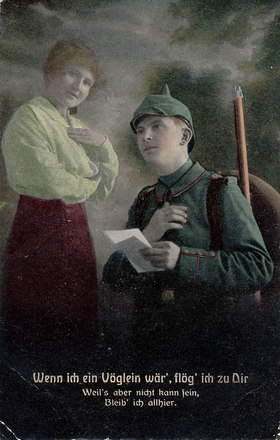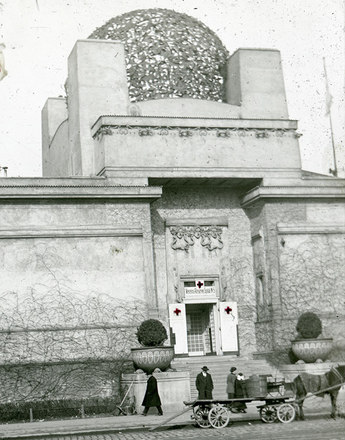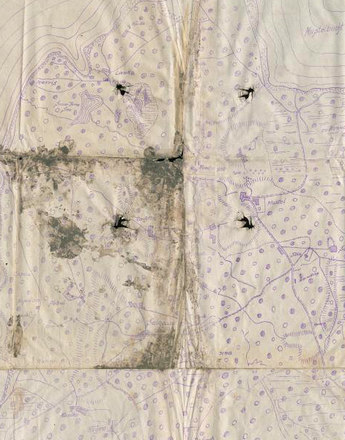‘In War the Muses Learn How to Serve’
The First World War led to a campaign by conservative art and culture critics against the ‘modern’. In page after page of treatises music critics and musicologists concerned themselves with the ‘analysis’ of the music being produced at the time and with performance practice; and they prescribed what the function and development of music in wartime should look like.
The Viennese musicologist Guido Adler called for ‘strict discipline in the business of the arts’. He went so far as to attribute to the latest instrumental music a debilitating effect on the nerves and expressed the opinion that it was the task of art ‘not [to] excite externally, but [to] uplift and purify’. Adler’s recommendation was that music should return to ‘pure sources’, which he located in simple song, chamber music and classical Viennese instrumental music. These genres should be promoted and brought to the people – not during the week but on Sunday afternoons. At the same time he strictly rejected the trend towards popular music for entertainment, above all the ‘plague of operetta’. He noted with satisfaction a development that he deduced from the letters of serving soldiers, which indicated that ‘music-hall songs were disappearing and better melodies making room for a serious and serene mood’.
The prominent music critic Julius Korngold observed that music was becoming superficial, with this trend having become dominant before the war in performances that aimed simply to please: ‘Are we not seeing these days how modern man is falling prey to his nerves … nerves of a kind that dream away insipidly, fret, worry, are erotically excited and – always enjoying themselves to excess?’ He saw in the war the chance to get back to thinking about what was ‘true’ and ‘natural’ in music, because it is ‘in war [that] the muses learn how to serve’. His verdict was just as critical as Adler’s regarding the ‘light’ music which had found a home in music halls, in operetta theatres and in expensive night clubs. What this endangered was ‘taste, in those cases where the inhibitions provided by a sound musical education are missing. To tell the truth, the air seems to have become cleaner since the war has produced favourite melodies which are more worthy of popular favour.’
Korngold drew up a canon of suitable pieces of music with Haydn’s national anthem in first place, which represented the ‘finest and richest inspiration’. Next on the list was the Prussian imperial anthem Heil Dir im Siegeskranz (Hail to Thee in Victory’s Wreath), because this provided in the way it was usually rendered an expression of German power and energy. However, in this case Korngold detected a problem, because the Prussian anthem was sung to the same melody as the British national anthem God Save the King, although this melody contained ‘something of the essence of German song’. Other pieces recommended on his list included the folk song Wenn ich ein Vöglein war (If I were a little bird), Die Wacht am Rhein (The Watch on the Rhine) and finally – as an answer to the ‘bloodthirsty Ça ira’ of the French – our Radetzky March, as well as ‘one of the finest war songs of all time … The Song of Prince Eugene.
Korngold ends by calling for restraint and austerity in the 1914-15 season. In selecting pieces large choirs and orchestras should take into consideration the heightened sense of community which leads ‘the crowd to turn to the crowd’. And that meant that he was also defining where concerts had to look for their material, namely ‘in the undoubted material of the masters’ and ‘in content about which there could be no doubt’. However, Korngold showed something of a liberal attitude towards ‘the literature of the enemy’, at least if its creators were already dead, because ‘may the war not disturb the peace of the dead’!
Translation: Leigh Bailey
Korngold, Julius: Krieg und Musik. Aphoristische Betrachtungen, in: Neue Freie Presse vom 31.10.1914, 1-4
Nussbaumer, Martina: „Jetzt ist die Stunde da, in der nur das Höchste laut werden darf.“ Zur Aufrüstung des klassischen Musiklebens, in: Pfoser, Alfred, Weigl, Andreas (Hrsg.): Im Epizentrum des Zusammenbruchs, Wien 2013, 374-385
Quotes:
Quotes Adler: Adler, Guido: Die österreichische Tonkunst und Weltkrieg, Wien 1915, zitiert nach: Nussbaumer, Martina: „Jetzt ist die Stunde da, in der nur das Höchste laut werden darf.“ Zur Aufrüstung des klassischen Musiklebens, in: Pfoser, Alfred, Weigl, Andreas (Hrsg.): Im Epizentrum des Zusammenbruchs, Wien 2013, 374-385, hier 377 (Translation)
Quotes Korngold: Korngold, Julius: Krieg und Musik. Aphoristische Betrachtungen, in: Neue Freie Presse vom 31.10.1914, 1-4 (Translation)
-
Chapters
- ‘Long jackets instead of Tailcoats’ – The Music Business in Times of Austerity
- Arousing Patriotic Sentiments in the Concert of Nations
- ‘In War the Muses Learn How to Serve’
- Serious Times – Serious Art
- ‘I’d like to dance, I’d like to shout for joy’ – Popular Music in the First World War
- ‘German Musical Life and How to Delouse It’ – Music for Use in the War
- ‘What the soldier in battle dress is singing now will be sung by the entire German people in rare unity.’ – Soldiers’ Songs as Collectors’ Items
- ‘It’s Hugo’s damned duty not to die for the fatherland before I’ve got my Act III.’ – Richard Strauss and the First World War
- Militarism and Terror Set to Music
- ‘La Victoire en chantant’ – The French chanson in the First World War
- Musical Innovations in the First World War
- Composers’ Fates: War, Death and the Longing for Peace and Overcoming Memories
- Star Composers and the Great War




